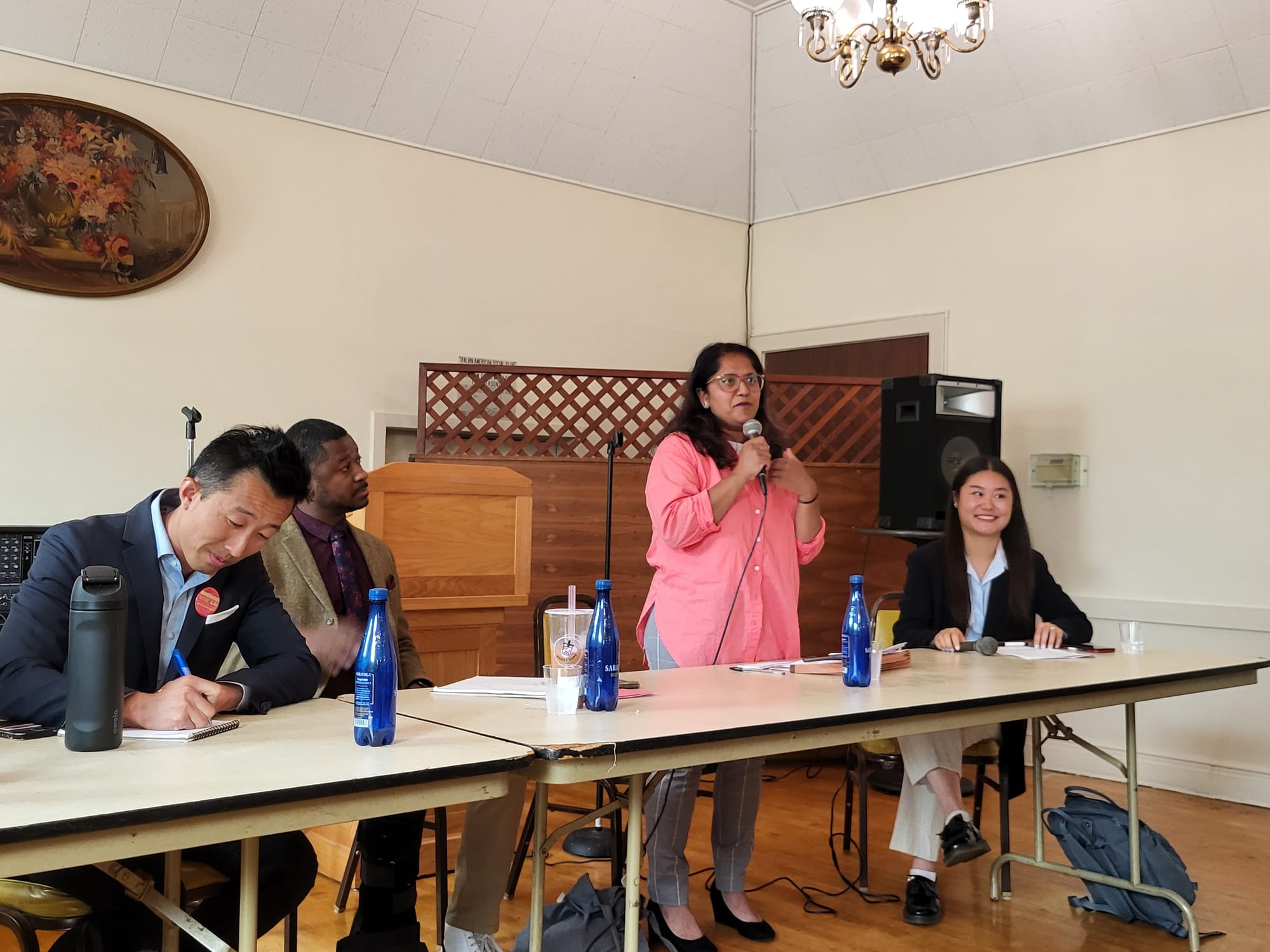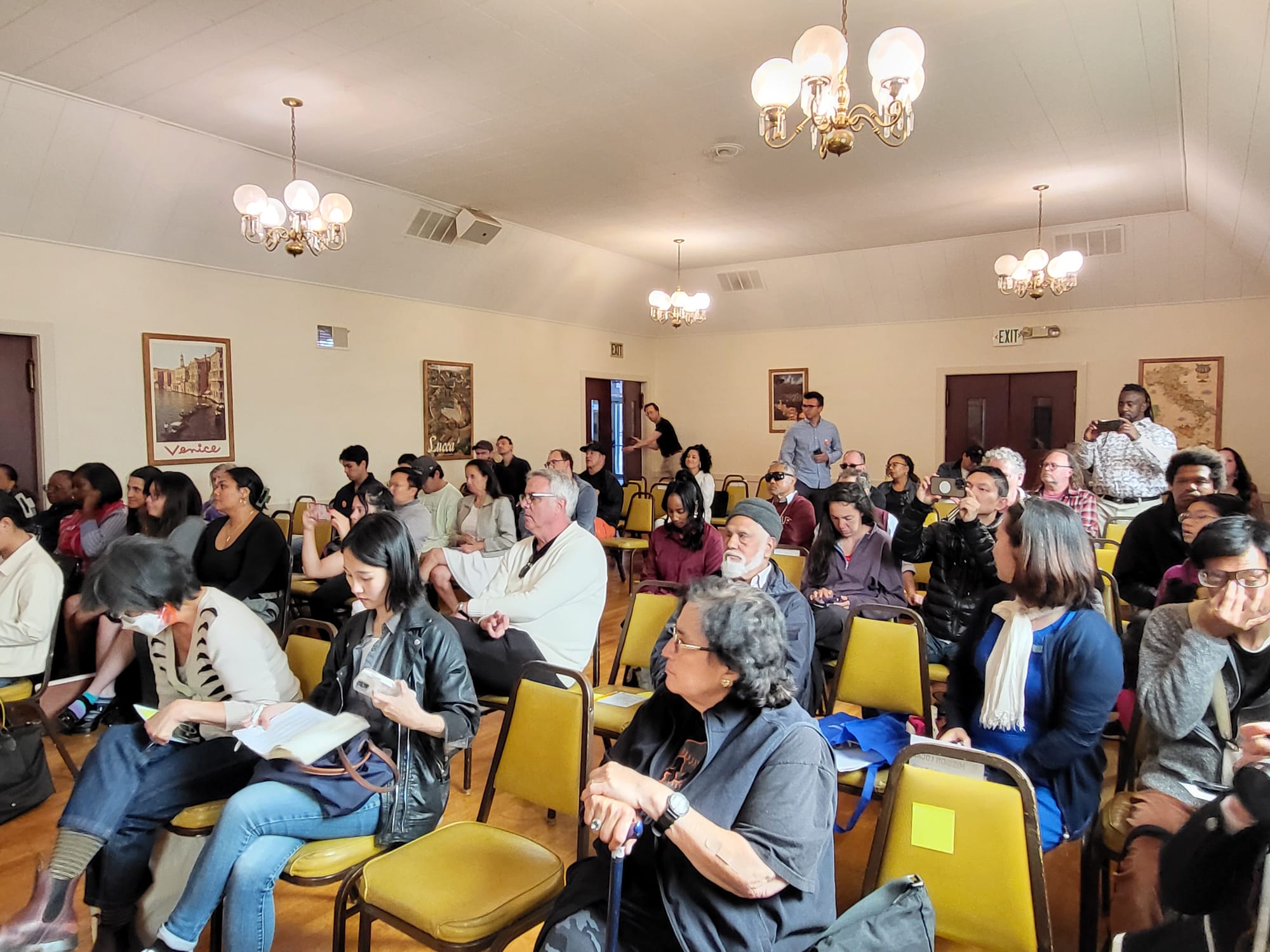School closures, resource distribution and who each would rank second on the ballot were all covered in the latest District 11 supervisor candidates debate.
The Italian American Social Club was nearly packed with spectators to see Mission Local reporter Xueer Lu quiz District 11 supervisor candidates Adlah Chisti, Ernest “EJ” Jones, Michael Lai, Chyanne Chen and Roger Marenco in a fourth debate of the electoral season. (Candidate Jose Morales was unable to attend due to an emergency.)
The debate was broken into four rounds with questions mainly coming from Mission Local staff. Audience questions were collected on post-it notes with two being asked toward the end. Lu said they might use the remaining questions for a “Meet the Candidates” series.
“This year, we're heavily leaning into election coverage,” Mission Local's Development Associate Vicky Anibarro. “We're asking all the supervisor candidates in every district to answer questions posed by all of you and so now we get to do a forum here, which is amazing.”
In the first round, candidates were given 60 seconds to answer questions and offered opportunities to give 30-second rebuttals. The first speaker for every question was alternated each time for fairness.
To start, candidates were asked how they would make park facilities more accessible to the public to counter the narrative that the district is forgotten by City Hall.
Marenco and Chisti both stated that the issue was funding. Marenco said that there needs to be a reappropriation of funds and facilities must be open longer during summer break. Chisti said the budget was a set of priorities and it's all about how to allocate those priorities like finding ways to staff and pay for more lifeguards at the Balboa Park Pool to keep it open for longer, something residents have been asking for.
Lai and Jones both found it important to have partnerships with departments like San Francisco Recreation and Parks and its partner Parks Alliance. Lai added that raising outside capital through Parks Alliance for projects would be helpful since the city is going through a substantial deficit this year.
Chen said funding resources and having robust community engagement were important. She helped organize Friends of Balboa Park to advocate for more services once she learned her neighbors traveled from Mission Terrace to Chinatown's YMCA to swim.
“To me, my priority is to continue to fight for more swimming, " Chen said. “More resources so District 11 can be livable, respected and all our needs and voices are heard in District 11.”
When asked how they would make sure city resources would be distributed fairly and equitably and where they see the biggest inequalities, all candidates touched on the need for advocacy.
Marenco and Lai shared similar sentiments on reappropriating funds. Lai said he'd try to peel back some of the red tape and work with other supervisors to prioritize the district.
Chisti said the district should adopt participatory budgeting like Districts 7 and 4 use it. She also said it was important to have a supervisor who is present in the community, has open lines of communication and would advocate for the district and its neighborhood organizations.
Chen and Jones both agreed on the need for community engagement. Jones added that there also needed to be an understanding of neighborhood organizations' needs with the resources they're given. Chen also said there was a need to continue language and cultural competence services that would reach all neighborhoods.
“As someone who's worked through the budget and stayed up until 5 a.m. in City Hall and had those conversations, it helps when you have community members that can show action behind the work that they're doing,” Jones said. “So for me, it's advocacy, bridge building and just making sure that we are a share that District 11 is doing big things on the forefront.”
Concluding round 1 was a question on who they'd rank as their second choice in the upcoming Nov. 5 election, assuming they'd take the first spot for themselves. Chen came out on top as the second choice for most candidates. They also gave their third-place choice, which went to Jones, Chisti and Marenco.

Chisti said there are only three qualified candidates in the race because they have lived in the community and understand the needs of the neighborhood. Her second choice was Chen and added that her third choice would be Jones.
“I think it's very important that we elect people who are from District 11 to office, who will continue to advocate for our district, who understand that we do have issues with parks in our district, who do understand that we have issues with safety [and] who understand we have issues with education in our district,” Chisti said.
Lai said he sensed there might be some “subtweeting at him” and said he has mixed emotions about the question. Without ranking them, he chose Chen, since they have similar upbringings like being first-generation immigrants and that representation was important and Jones, due to all of his work in Ocean View-Merced Heights-Ingleside. He also said he might write in longtime community members like Al Perez for the position.
When asked to clarify his stance, Chen broke the tension by saying Lai chose her first and then Jones, which caused the whole room to laugh. Jones, who's in a medical boot, offered to have a race for the spot and Lai stood his ground on being undecided.
As for Chen, she ranked Jones as second since they share similar endorsements and allies and ranked Chisti as third since she is another woman in the race and for their shared understanding of the industry and values on providing equitable quality senior care.
Marenco also said he’d vote for Jones as second and would offer him a job as a legislative aide. Jones joked that he might consider it.
Round two took a different format and asked each candidate one individual question, giving each 60 seconds to respond.
Lu asked Chisti about her time working on Jones’ campaign before entering the race and what led her to run against him.
Chisti said she had an epiphany and realized she was a viable candidate as someone who grew up in the district, has a family to care for and possesses the education and political experience to also represent the neighborhood's values.
Jones, who spent nearly two years working as a legislative aide to current District 11 supervisor Asha Safaí, was asked what he felt Safaí didn't do well as a supervisor that he wishes to improve on if elected.
Jones said that while Safaí did a good job at listening to certain community members, but he didn't do a good job at listening to every community member which is something he plans to do by building partnerships across the district.
Lai, who moved to the district in February, was asked how he planned to gain the trust of those in the community who believe he only moved to the area to run for supervisor.
While he has lived in San Francisco for 10 years, he said that the Excelsior neighborhood and the District 11 community were the first to remind him of his upbringing in China.
“Even though I haven't been as long as some of the other folks here, what I keep hearing on the doors is that people want someone who's going to fight for a forgotten district and it's about what someone can do in the future,” Lai said. “ I'll say, I have trust to build with you all who have been here a long time, community leaders. Regardless of whether you vote for me or not, I will be here to learn from you and to try to represent you the best that I can and bring my unique abilities to fight for this district.”
Marenco, who has had strong opinions throughout the election cycle on how to handle crime, was asked if he was serious about his plans to take a page out of El Salvadoran President Nayib Bukele’s book by locking up all offenders and how he planned to do so with the limited space in San Francisco's jails.
He said he was serious and would work to amend Proposition 47, which charges property theft and drug possession offenders as misdemeanors if under $950, to spend 950 hours in jail instead.
Chen was asked what differences she saw between being a labor organizer and a district supervisor. She said there weren't many. She touched on tools that could be helpful as a supervisor such as listening to diverse communities to ensure that policies reflect on the needs of District 11 residents.
During the lightning round, candidates were given several seconds to respond to questions on their favorite Muni lines, if there was a need for more bike shares, if they've ridden in a Waymo, their favorite restaurant in the district, their political role models, where the next public restroom should go and their favorite District 11 tradition.

While answers varied on traditions, all were tied to community events like Sunday Streets, pasta parties, Jerry Day, OMI/Lakeview Family Day and Omino Day.
The fourth and final round concluded with a question on what they thought the role of District 11 supervisor was in providing access to high-quality public schools throughout the district.
All candidates echoed a need for resources, namely the use of funds from Baby Prop. C, a commercial rent tax for childcare and early education, for things like child care and after-school programs.
Lai, who's spent most of his career working in early education, said it was important to build connections with those who are on and running for the Board of Education to help advocate for resources. He also said there needed to be a focus on things that affect schools like the rise of youth homelessness by crafting ordinances to create permanent supportive housing.
Chen shared similar thoughts to Lai on housing, and added the need for teacher housing and programs to help end child hunger throughout the city.
While the Board of Education makes the majority of decisions, Jones said supervisors can provide support by allocating funds to be spent towards programs and parent educators and can also be the community's voice by listening and rallying them to show up at board meetings like advocating for language access.
Chisti said all 11 supervisors should attend school board meetings. She also said school culture was important since it is one of the pieces of criteria being used to access school closures.
Marenco, who is a transit operator, said that redirecting funds toward public education from SFMTA for instance, participating in school board meetings and building personal and individual bridges between the school board, families and schools were vital.
“What we can do is encourage teachers to apply for these jobs by reappropriating the funds and making it so that a teacher can earn the same as a transit operator because there's no reason in heck or in San Francisco why a bus driver should be earning more money than a teacher,” Marenco said.
Correction: This has been updated to fix a typo and reflect that EJ Jones worked for just less than two years as a legislative aide.










